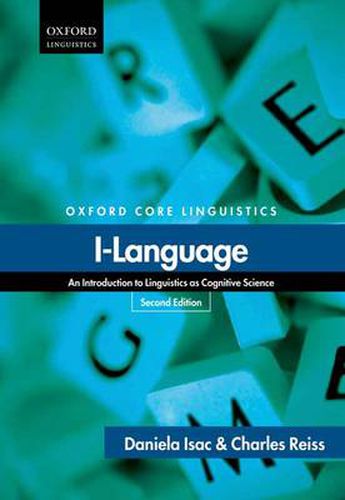Readings Newsletter
Become a Readings Member to make your shopping experience even easier.
Sign in or sign up for free!
You’re not far away from qualifying for FREE standard shipping within Australia
You’ve qualified for FREE standard shipping within Australia
The cart is loading…






I-Language introduces the uninitiated to linguistics as cognitive science. In an engaging, down-to-earth style Daniela Isac and Charles Reiss give a crystal-clear demonstration of the application of the scientific method in linguistic theory. Their presentation of the research program inspired by Noam Chomsky shows how the focus of theory and research in linguistics shifted from treating language as a disembodied, human-external entity to cognitive biolinguistics - the study of language as a human cognitive system embedded within the mind/brain of each individual. The recurring theme of equivalence classes in linguistic computation ties together the presentation of material from phonology, morphology, syntax, and semantics. The same theme is used to help students understand the place of linguistics in the broader context of the cognitive sciences, by drawing on examples from vision, audition and even animal cognition. This textbook is unique in its integration of empirical issues of linguistic analysis, engagement with philosophical questions that arise in the study of language, and treatment of the history of the field. Topics ranging from allophony to reduplication, ergativity, and negative polarity are invoked to show the implications of findings in cognitive biolinguistics for philosophical issues like reference, the mind-body problem, and nature-nurture debates.The well-tested material in the book is appropriate for a variety of audiences, from large introductory courses in linguistics to graduate seminars in cognitive science or philosophy of mind. It contains numerous exercises and guides for further reading as well as ideas for student projects. A companion website with guidance for instructors and answers to the exercises features a series of pdf slide presentations to accompany the teaching of each topic. This fully revised and updated second edition includes additional exercises and expanded discussions on topics such as language and culture, philosophy, and rationalist explorations of language and mind.
$9.00 standard shipping within Australia
FREE standard shipping within Australia for orders over $100.00
Express & International shipping calculated at checkout
I-Language introduces the uninitiated to linguistics as cognitive science. In an engaging, down-to-earth style Daniela Isac and Charles Reiss give a crystal-clear demonstration of the application of the scientific method in linguistic theory. Their presentation of the research program inspired by Noam Chomsky shows how the focus of theory and research in linguistics shifted from treating language as a disembodied, human-external entity to cognitive biolinguistics - the study of language as a human cognitive system embedded within the mind/brain of each individual. The recurring theme of equivalence classes in linguistic computation ties together the presentation of material from phonology, morphology, syntax, and semantics. The same theme is used to help students understand the place of linguistics in the broader context of the cognitive sciences, by drawing on examples from vision, audition and even animal cognition. This textbook is unique in its integration of empirical issues of linguistic analysis, engagement with philosophical questions that arise in the study of language, and treatment of the history of the field. Topics ranging from allophony to reduplication, ergativity, and negative polarity are invoked to show the implications of findings in cognitive biolinguistics for philosophical issues like reference, the mind-body problem, and nature-nurture debates.The well-tested material in the book is appropriate for a variety of audiences, from large introductory courses in linguistics to graduate seminars in cognitive science or philosophy of mind. It contains numerous exercises and guides for further reading as well as ideas for student projects. A companion website with guidance for instructors and answers to the exercises features a series of pdf slide presentations to accompany the teaching of each topic. This fully revised and updated second edition includes additional exercises and expanded discussions on topics such as language and culture, philosophy, and rationalist explorations of language and mind.